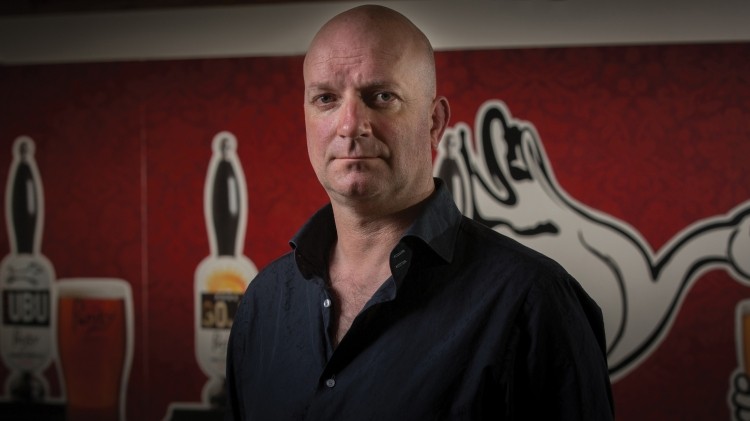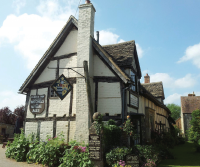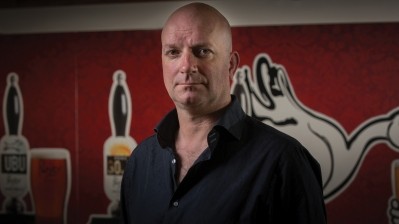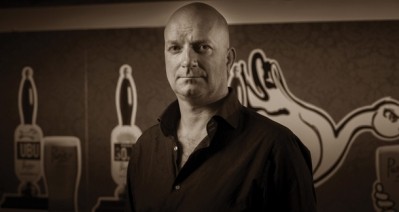Big Interview
'We tell people nicely "we don't do Carling"'...interviewing Purity's founder

Pure Ubu. That has to be named after the cult American rock band, Pere Ubu, right? Paul Halsey shifts his 6ft 7in frame a little in his seat and sticks to the official line. “Actually, it’s named after the brewery dog, Ubu.”
I’m not having that. For me, daring to name a cask ale after Pere Ubu way back in 2006 was what made Purity Brewing Company jump off the bar. Here was a brewer that really was trying to make
handpumped beer sexy and cool and just a bit edgy.
Of course, since then we’ve had the craft beer revolution. Since Halsey and Jim Minkin started brewing in farm buildings in Warwickshire, the rest of world has caught up. The pub we’re sitting in is evidence of that.
Bar
Birmingham’s Pure Bar & Kitchen, a joint venture between Purity, chef Andreas Antona, and former Mitchells & Butlers operations director Martin Hilton, has been open for just over a year. It’s a big open space with clean, hard surfaces that follows the mode for industrial chic with an open kitchen and, most importantly, a long slab of a bar that’s all about
the beer.
Purity’s brands are there, of course, but they mingle with interesting brews from around the globe. There are 10 handpumps, seven in use, 14 keg taps and 70 different bottles.
The keg taps are unbadged. Unsettling for the old-fashioned pubgoer but right in tune with those young folk who are discovering the excitement of beer.
The range available is displayed on a board including a tasting note, the ABV and, gasp, the IBU. So this is what we’ve come to. Choosing a beer for its bitterness units.
Halsey “always had in mind a small pub estate” for Purity, “but the cost of property at the time was too high and it went off the radar”.
The beer must also have been a distraction. Halsey had brought to the new business a determined focus on quality, born from a career in brewing and hospitality that began in his boyhood.
“I’d had a background in kitchens, I’d worked in them since the age of 12 in my mother’s family business, and I did an HND in hospitality at Slough College. My passion has always been food and beer.
“I worked for Bass for six years from the late 1980s, essentially in sales. When they wanted me to relocate to London I took the opportunity to leave and run my own pub.”
The Butchers Arms, at Hepworth, in Yorkshire, was “a major success” before he was lured back into the corporate world by former Bass colleague Steve Nuttall who invited him to be part of the management buyout team that took over the Bass Highgate Brewery in Walsall.
By 2001, though, he was back behind the bar. “I found a derelict rural pub near Halifax. It had been shut for 18 months and the pub company was desperate to offload it.”
Pure style
Again, Halsey put in “a good beer and food” offer and turned it around before selling it to a multiple operator and teaming up with Minkin, a former finance manager at M&B, to form Purity.
Neil Bain, the brewer at Highgate, helped out for the first year before they found Frenchman Florent Vialan, known to all as Flo, who established the Purity brewing style and is still there today.
“We wanted to get back to what brewing’s about: quality ingredients, ecological credentials,” explains Halsey. “We looked to brewers like Butcombe and Black Sheep, brewers with a small range of quality beers.
“We also wanted to aim at a younger, more female market, a market that had not been engaged by cask beers.”
That was achieved with “fresh, clear branding that stands out and has personality and character”.
“That was before craft beer exploded, of course. Since then we’ve shifted with the market, seen gaps and opportunities. It’s about engaging a new audience for beer.
“And we kept away from the value end of the market and tried to work with people with similar values.”
Key dates
- 1985: After gaining an HND in hospitality at Slough College, Paul Halsey goes on to study Hotel & Catering Management at Thames Valley University
- 1988: Halsey joins the Bass graduate recruitment scheme and works in various sales roles for the company
- 1994: Takes his own pub, the Butchers Arms, Hepworth, West Yorkshire
- 1996: Joins the MBO of Highgate & Walsall Brewing Company where he becomes commercial director
- 2001: Turns around the Millbank pub near Halifax, West Yorkshire
- 2005: Sells the Millbank and founds Purity Brewing with Jim Minkin
- 2006: Pure Gold and Pure Ubu launched
- 2008: Mad Goose joins the range
- 2013: New brewery built to keep up with demand. Saddle Black becomes Purity’s fourth core beer
- 2014: Pure Bar & Kitchen opens in Birmingham. Craft lager Lawless added to the portfolio
Quality
Working closely with licensees to ensure the quality of the brew is carried right through to the glass has been crucial.
“Our model is to deal direct with pubs, not wholesalers. Quality is key for cask beer and often the knowledge and the skills are not there. So we run courses and work with Alex Barlow at All Beer on quarterly events on cellarmanship and brewing for our customers.”
Thanks to that approach, the original 20-barrel brewing plant hit capacity after seven years.
“We were selling 200 barrels a week. I never thought we would grow so fast,” says Halsey. “We had to decide — do we sweat what we have or build a new brewery and grow some more?”
The new brewery was commissioned towards the end of 2013 giving the potential to brew 35,000 barrels a year and supplement its cask range with two craft keg beers — Longhorn IPA and Lawless Lager.
Capacity
It’s already half way to capacity and new fermenters were due to be installed this spring.
Around the same time as the brewery’s expansion, Purity began looking for a site for its first pub. Creating Pure Craft Bars as a partnership between the brewery, Hilton and Antona has allowed Halsey to maintain his focus on the beer, he says.
“Martin takes the pressure off so I can play to my strengths and explore my creative side. It’s a match made in heaven, really.”
With the Birmingham Pure Bar and Kitchen taking £1.3m in its first year, the concept looks set to appear elsewhere. Halsey believes there’s a potential for “three or four” in urban locations and has his eye on Manchester, Nottingham, Bristol, London and Liverpool.
There’s a gap in the market, he thinks, for a craft beer bar that’s welcoming, rather than intimidating, to those new to the scene.
“Whoever you are, you’re welcome. It’s a democratic offer, everyone’s treated the same. We have to tell people nicely when they ask that we ‘don’t do Carling’ and we have a responsibility to educate. ”
Food
Pure bars also has an important part to play in the underdeveloped art of matching beer with food.
“The execution of beer and food matching in the trade has been very poor,” he says, believing it’s the bad choice of beers that has held back progress. “How can you care about food and offer commodity beer to go with it? We’re working with beer writers to get it right, and our staff are trained. You have to do that regularly, and we have monthly training sessions here. It’s important, too, that there’s no mystique about it, that it’s not too poncey.”
There’s no doubt that the time is right for such a venture.
“People want something different,” he says. “There are opportunities for pushing the boundaries and doing things no one’s thought of before. And people want knowledge — the kind of knowledge that’s also a pleasure. It’s a fantastic time for the beer industry.”
And a fantastic time for Paul Halsey, too, by the sound of it.
“This is more like a hobby for me,” he says. “I wouldn’t change it for anything.”
My kind of pub
“The kind of pub I go for depends on my emotional state! There’s one for every pub I like. “If I’m walking by the water, it’s the Fleece Inn, in Bretforton, in Worcestershire. It’s a National Trust-owned pub with flagstone floors.”





